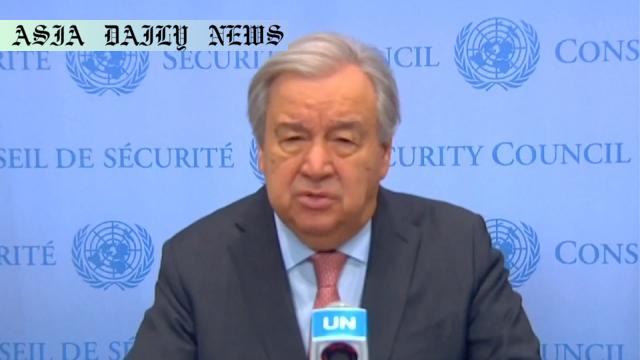Myanmar gains international surge of emergency aid and disaster relief teams from the UN and major global nations after a crisis.
- The United Nations pledges $5 million for Myanmar’s rescue and reconstruction efforts.
- Disaster response teams from Russia and the US are ready to mobilize.
- Myanmar’s international call for help sparks significant global responses.

Global Efforts to Support Myanmar Amid Crisis
The international community has stepped up to assist Myanmar as it faces significant challenges. The United Nations, led by Secretary-General Antonio Guterres, has acknowledged Myanmar’s formal request for emergency assistance. In an immediate response, the UN announced plans to provide $5 million for rescue operations and reconstruction efforts. This funding is expected to support relief activities and provide critical resources to those most in need during this troubling time.
Beyond financial aid, the UN has assembled an on-the-ground team in Myanmar to coordinate the delivery of humanitarian assistance efficiently. The initiative highlights the global body’s commitment to ensuring rapid and effective disaster response to alleviate human suffering. This collaborative effort underscores the increasing importance of international solidarity during crises, demonstrating the capacity of nations and organizations to come together for a greater cause.
Russia Leads With Immediate Action
Russia has been among the first nations to confirm and dispatch aid to Myanmar. The Russian Emergency Ministry has announced the deployment of a 120-member rescue team, including emergency responders, medical staff, and technical experts. This swift action reflects the strong bilateral ties between Russia and Myanmar, which have been strengthening in recent years. The effort shows how strategic partnerships can serve not only political or economic interests but also provide vital assistance during times of humanitarian need.
This move further solidifies Russia’s active role in the international humanitarian aid ecosystem. Emergency deployments such as this enhance global collaboration in addressing and mitigating the impact of natural disasters or other emergencies. Meanwhile, Myanmar’s reliance on global partnerships for disaster management showcases the interconnectedness of the modern world in addressing shared challenges.
The US Commits to Aid With Conditions
In addition to the UN and Russia, the United States has expressed readiness to provide significant support, contingent upon a formal request from Myanmar’s government. President Donald Trump affirmed the nation’s willingness to assist, emphasizing the deployment of specialized disaster expert teams by the State Department. These professionals are poised to deliver immediate and effective support upon activation. The US response highlights its continued commitment to global humanitarian efforts, underscoring the country’s robust disaster response capabilities.
This conditional approach, however, also brings to light the complexities of international aid. Balancing formal diplomatic processes with urgent disaster responses can be challenging, especially when lives and livelihoods hang in the balance. Despite these challenges, the solidarity shown by various countries offers hope for Myanmar as it navigates a difficult period.
Myanmar’s Resilience in Seeking Global Aid
Myanmar’s appeal for international support frames its proactive approach to addressing its challenges. The collective response from entities such as the UN, Russia, and the US reflects both Myanmar’s strategic global relationships and the moral responsibility of other nations to assist during a crisis. Such efforts emphasize the importance of shared global responsibility and the centrality of multilateral frameworks in disaster response and recovery.
Moving forward, the success of these operations will largely depend on effective coordination between Myanmar’s authorities and its international partners. Transparency, swift action, and targeted resource allocation will be critical in ensuring that aid reaches the most vulnerable populations. As Myanmar works to rebuild and recover, the global community’s support will play a pivotal role in shaping the outcomes of this crisis response endeavor.



Commentary
Importance of International Solidarity
It is heartening to see the world come together to support Myanmar during its time of need. Disasters and crises call for collective action, and when nations unite for a shared purpose, the impact can be powerful and transformative. The swift response from organizations like the United Nations and countries such as Russia and the United States highlights the ability of the global community to prioritize humanity above politics.
There is a lesson here for all of us. The importance of fostering diplomatic ties and engaging in active international cooperation cannot be understated. In a world that often feels fractured along ideological, political, and economic lines, we are reminded that we are more connected than we might realize. Disasters of one nation inevitably ripple across a shared planet, emphasizing our collective destiny.
The Strategic Role of Specialized Teams
The deployment of specialized disaster response teams demonstrates another crucial facet of advanced humanitarian aid. These teams bring vital expertise that can save lives and provide long-term solutions. The commitment from international bodies and individual nations to train and dispatch such teams highlights the evolution of global aid practices. However, ensuring that these efforts coordinate seamlessly with local teams remains essential for maximum impact.
Myanmar’s call for help exemplifies the importance of preparedness and punctuality. The transition from immediate emergency relief to systematic rebuilding and recovery requires planning and foresight. The collective commitment on display here strengthens optimism that efficient and collaborative efforts will help Myanmar rebuild effectively.
Towards Resilience and Hope
As Myanmar navigates this crisis, the global response not only demonstrates the power of collective humanity but also signals hope for recovery and resilience. While initial responses focus on emergency needs, long-term strategies must emphasize sustainable rebuilding, addressing systemic inequalities, and empowering local communities to prevent and address future challenges by themselves.
In times of crisis, collective humanity takes center stage. True global progress will be measured by how effectively we look beyond boundaries to ensure that every community, every individual, and every nation can face the future with resilience and strength. Myanmar’s call for help, and the response from the world, is a testament to this principle. May it guide the course of recovery and inspire us all to remain committed to a shared humanity.